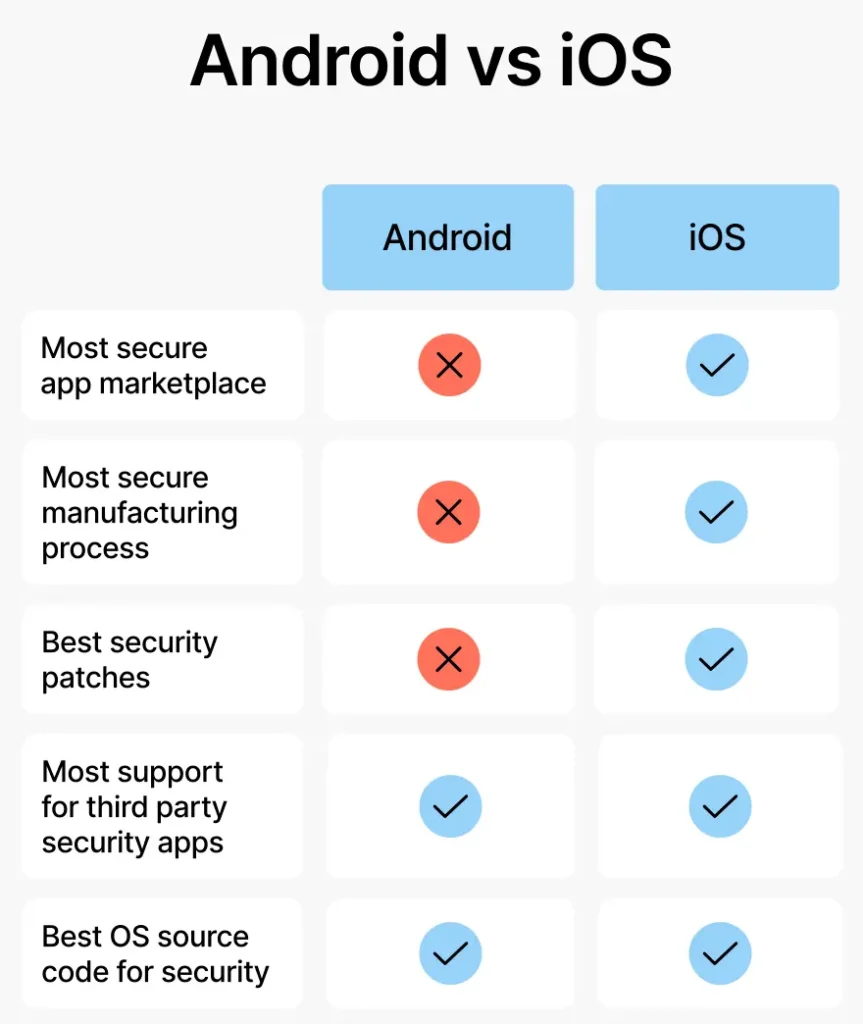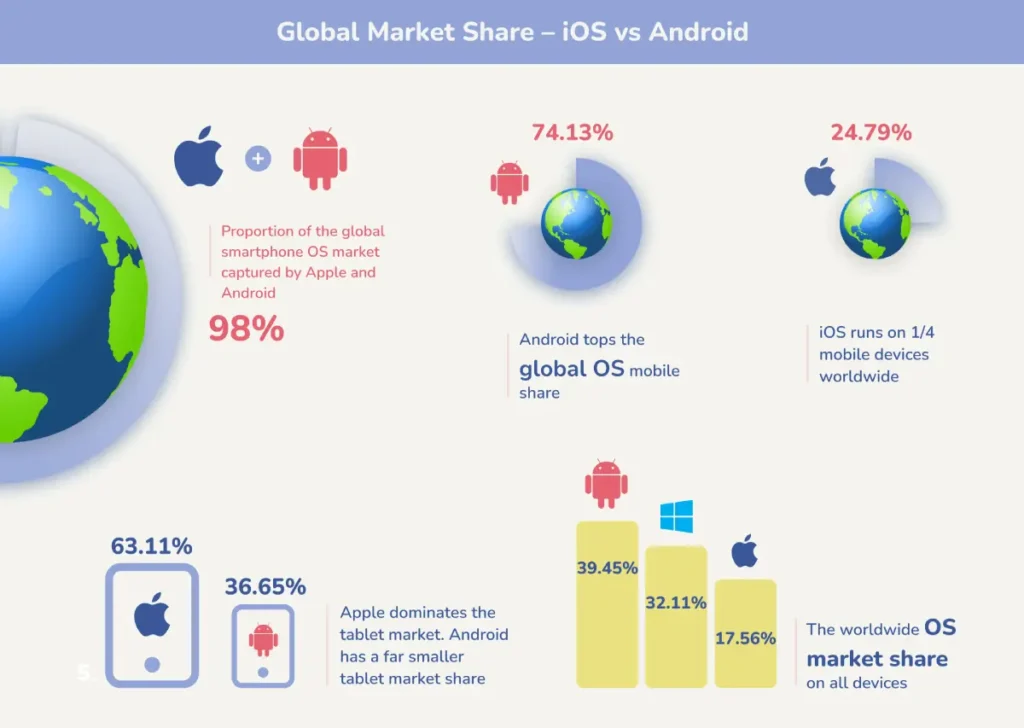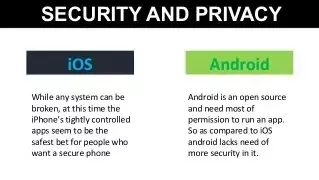In today’s tech-driven world, mobile app development has become an integral part of businesses and innovation. Among the numerous platforms available, Android vs iOS stand out as giants, each with its unique ecosystem and approach to development. Understanding the nuances and differences between these platforms is crucial for developers aiming to create successful and impactful applications.

Introduction
The rivalry between Android vs iOS has shaped the landscape of mobile development. Android, developed by Google, boasts the largest market share globally, offering an open-source platform that allows for diverse hardware and software innovation. On the other hand, Apple’s iOS, known for its closed ecosystem, emphasizes user experience, security, and quality control.
Android vs iOS Security Comparison

The Android vs iOS security comparison highlights the contrasting approaches to mobile device security. Android, known for its open-source flexibility, faces challenges with malware and fragmentation, mitigated by Google’s security measures.
In contrast, iOS operates within a closed ecosystem, ensuring tighter control over app distribution and prompt, synchronized security updates. The debate centers on the trade-off between Android’s customization and iOS’s streamlined security, impacting user preferences based on individual priorities and risk tolerance.
The Two Operating System Monarchs are Android vs iOs
Did you realize that the global smartphone user base now numbers over 6.7 billion? Considering that there were less than 2 billion active users at the end of 2016, it is a rather dramatic surge!
Since its introduction to the market in 2007, both Android and iOS have seen rapid growth and market share. It is astounding to learn that just two operating systems power 98% of cellphones.
A major factor in their success is that Apple and Google, two trillion-dollar corporations with unrivaled resources, are the owners of Android vs iOs, respectively. However, their success is much more than simply financial.
Their convenience and usefulness captivate people, which may be the reason why these two business titans haven’t had any noteworthy competition. But how about comparing these two in a head-to-head match? In what ways do they now compete with one another in the market?
Android vs iOS Privacy
The Android vs iOS privacy comparison delves into how these mobile operating systems handle user data. Android, with its open-source nature, provides extensive customization but faces privacy concerns due to diverse app permissions. Google has implemented measures such as Privacy Dashboard and Scoped Storage to enhance user control.

In contrast, iOS, known for its stringent privacy policies, emphasizes user consent, limiting app tracking and employing features like App Tracking Transparency. The choice between Android and iOS privacy hinges on the balance users seek between customization and stringent data protection.
Statistics reveal Android’s dominance in terms of market share, primarily due to its availability across a wide range of devices, catering to various demographics. Conversely, iOS users are known for their engagement and higher app spending, making them an attractive target audience for certain applications.

Development Environment
When it comes to development, the environments for Android and iOS differ significantly. Android utilizes Java or Kotlin languages, providing developers with flexibility, while iOS focuses on Swift or Objective-C, prioritizing performance and user experience.
App Store Ecosystem
Submitting an app to the Google Play Store versus the Apple App Store varies in terms of guidelines, approval processes, and revenue models. Android offers more freedom but faces challenges with app discovery, while iOS maintains stricter guidelines, ensuring higher quality but limiting flexibility.
Fragmentation and Device Compatibility
Android’s biggest challenge lies in fragmentation, with various devices running different versions of the operating system, impacting app compatibility. In contrast, iOS devices enjoy uniformity, simplifying development and ensuring consistency across devices.
Customization and Flexibility
Android developers revel in the platform’s customization options, allowing for unique app experiences tailored to user preferences. Conversely, iOS maintains a standardized interface, focusing on uniformity and ease of use.
Security and Privacy

Security is a paramount concern for both platforms. iOS is recognized for its stringent security measures, emphasizing user privacy and data protection. Android has made significant strides in enhancing security but faces more vulnerabilities due to its open nature.
Performance and Optimization
Performance benchmarks often highlight iOS devices’ smooth operation and optimization due to Apple’s control over hardware and software. Android, while improving, faces challenges in ensuring consistent performance across various devices.
Support and Updates
The frequency and longevity of updates differ between Android and iOS, with iOS devices receiving consistent updates for a longer duration. Additionally, the developer support and community engagement vary significantly between the two platforms.
Conclusion
In conclusion, the choice between Android vs iOs development involves understanding the unique characteristics and priorities of each platform. Both offer opportunities for innovation and success, catering to different needs and preferences in the dynamic world of mobile app development.
FAQ’s
Which platform is better for app development, Android, or iOS?
The decision is based on the particular project needs. Android offers flexibility, while iOS focuses on performance and security.
Are there significant differences in revenue generation between Android and iOS apps?
iOS users generally spend more on apps compared to Android users, but success depends on various factors beyond the platform.
Does fragmentation in Android affect app development significantly?
Fragmentation can pose challenges in ensuring app compatibility across various devices, requiring additional testing and optimization.
Are app development costs higher for Android vs iOs?
Costs can vary based on the complexity of the app and specific development requirements rather than the platform itself.
Which platform receives more frequent updates, Android vs iOs?
iOS devices typically receive more consistent and longer-term updates compared to Android devices.
